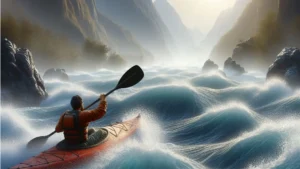What the heck is Wu Wei?
 I’ve become fascinated by the concept of Wu Wei, or surrender; letting go; effortless action. How do we reconcile these concepts with a life spent in the service of planning our lives and strategizing the future? It’s not intuitive, and profoundly uncomfortable, but I think there’s magic to be found in the exploration. Read on if something in the idea of “letting go” is calling to you too:
I’ve become fascinated by the concept of Wu Wei, or surrender; letting go; effortless action. How do we reconcile these concepts with a life spent in the service of planning our lives and strategizing the future? It’s not intuitive, and profoundly uncomfortable, but I think there’s magic to be found in the exploration. Read on if something in the idea of “letting go” is calling to you too:
In a hidden valley nestled amidst the Jade Mountains lived a young farmer named Li. Known for his relentless work ethic, Li toiled tirelessly from dawn to dusk, tending his fields with the same fervor he wielded his plow. Yet, despite his efforts, his crops remained stubbornly meagre.
One day, while weeding his parched land, Li stumbled upon an old man meditating under a gnarled peach tree. Frustration etched on his face, Li poured out his woes, lamenting his seemingly futile labors.
The old man, his eyes twinkling with wisdom, chuckled gently. “Young Li,” he said, “you strive with admirable effort, but perhaps you fight the current instead of flowing with it. Have you heard of Wu Wei, the art of effortless action?”
Intrigued, Li listened intently as the old man explained the Taoist philosophy. “Wu Wei is not about idleness,” he said, “but about aligning your actions with the natural flow of things. Like water carving its path through stone, true progress comes from understanding the nature of the challenge and responding with harmony, not force.”
Li pondered this newfound wisdom, his mind buzzing with questions. The old man smiled and invited him to stay, offering him a glimpse into the life of Wu Wei.
Over the next few days, Li observed the old man’s effortless grace. He saw how he tended his garden with minimal effort, yet the plants thrived. He learned to read the whispers of the wind, the rhythm of the rain, and the language of the land.
One morning, Li woke to find the old man gone, leaving only a single peach on his doorstep. As he bit into the fruit, a burst of flavor and understanding flooded his senses. He finally grasped the essence of Wu Wei.
Returning to his fields, Li no longer fought the soil. He adapted his methods, working with the land instead of against it. He learned to listen to the whispers of the earth, nurturing his crops with understanding rather than brute force.
And slowly, miraculously, his fields began to flourish. The once-barren land yielded abundant harvests, a testament to the power of Wu Wei.
Li’s story became a legend, a reminder that true progress often lies not in force, but in harmony, in understanding the flow of things, and in the wisdom of letting go. He became a beacon of Wu Wei, teaching others to cultivate effortless action and reap the rewards of flowing with the natural order.

By embracing Wu Wei, you can cultivate a more natural and effortless approach to decision-making, leading to more aligned and effective actions.
Now, imagine yourself standing atop a mountain, gazing at the valley below. The wind whispers secrets of ancient wisdom, and a sense of calm washes over you. Perhaps this is where Lao Tzu, the father of Taoism, gleaned the essence of Wu Wei, a concept often misinterpreted as mere inaction. But for the modern man, laden with responsibilities and societal expectations, Wu Wei offers a powerful perspective: not the absence of action, but the art of taking the right action, at the right time.
Forget the image of a passive monk meditating in seclusion. Instead, visualize Bruce Lee, water flowing through rock, or a skilled archer hitting the target effortlessly. These embody the true spirit of Wu Wei – aligning ourselves with the natural flow of things, acting with awareness and purpose, and avoiding the struggle against the current.
But how does this ancient philosophy translate to the complex lives of men today?
Statistics paint a concerning picture: a 2020 study by the American Psychological Association found that nearly half of men (48%) report feeling stressed most of the time. The constant pressure to “do more, be more” can leave us feeling lost, disconnected from our true selves.
Living intentionally might seem like a luxury, but for men between 35 and 50, it’s a necessity. This is the age when the call of the soul often grows louder, urging us to break free from autopilot and create a life filled with meaning.
Here’s how practicing Wu wei can be reconciled with decisiveness:
Deep understanding: Wu wei emphasizes attunement to the situation and acting in harmony with it. This requires deep understanding of the context, the people involved, and the potential consequences of your actions. By gathering information, reflecting, and considering different perspectives, you make informed decisions aligned with the natural order.
Letting go of control: A key aspect of Wu wei is surrendering to the flow of things. This doesn’t mean becoming passive,but rather trusting that the right action will emerge when you’re in tune with the situation. Instead of forcing a decision,allow space for organic development and insights to arise.
Spontaneous action: When aligned with the natural flow, action becomes effortless and spontaneous. When the time is right, the decision becomes clear, and you can act with confidence and decisiveness, knowing you’re in harmony with the situation.
Acceptance: Wu wei encourages accepting the situation as it is, even if it’s not ideal. Sometimes, the most decisive action is letting go of resistance and allowing things to unfold naturally. This doesn’t mean giving up, but rather trusting that even setbacks can be opportunities for learning and growth.
Remember:
- Wu wei is not about inaction: It’s about acting in accordance with the natural flow, which often requires decisive action at the right time.
- It’s a practice, not a destination: Cultivating wu wei takes time and effort. Be patient with yourself and focus on the process of becoming more attuned to the flow of things.
- Seek guidance: Learn from Taoist teachings and practices to deepen your understanding of wu wei and integrate it into your decision-making process.
By embracing wu wei, you can cultivate a more natural and effortless approach to decision-making, leading to more aligned and effective actions.
Here are some additional tips for practicing wu wei and maintaining decisiveness:
- Meditate: Meditation can help you quiet your mind, become more aware of your inner flow, and make decisions from a place of calm clarity.
- Spend time in nature: Immersing yourself in nature can help you reconnect with the natural world and its effortless flow.
- Practice mindfulness: Be present in the moment and pay attention to your intuition and gut feelings.
- Trust your instincts: Sometimes, the best decisions are made based on intuition rather than overthinking.
- Don’t be afraid to take action: Once you have a clear decision, don’t hesitate to take action. Trust that you are acting in accordance with the natural flow.
Remember, Wu Wei is not about retreating from life, but about engaging with it authentically. It’s about letting go of the unnecessary struggle and aligning yourself with the flow. So, dear men, ask yourselves: What is your true purpose or purposes? What action, aligned with your soul’s calling, will bring you closer to a feeling of full health? I’m not talking about just the body. I mean health in every area of your life.
The journey begins with a single step, a conscious choice to move beyond the noise and embrace the art of mindful action. Are you ready to answer the call?




